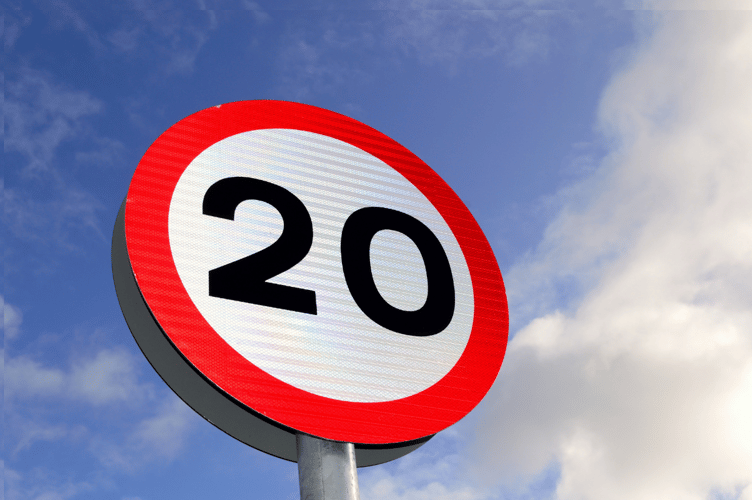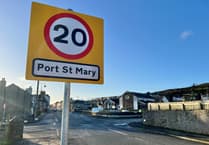A ‘threat to remove a minister with a shotgun’ has triggered a government-wide review of security measures for Tynwald members.
Infrastructure Minister Michelle Haywood has spoken publicly about the level of abuse she’s received over the rollout of 20mph speed limits, revealing she’s had letters pushed through her door in the early hours and been the target of disturbing online threats.
The Tynwald office has since issued fresh security guidance to all members about meeting the public and managing their safety in both digital and physical spaces.
Dr Haywood told the Isle of Man Today she has since met with police, and that her department has changed its internal security protocols.
‘It’s obviously well known that there were threats about, how do you remove a minister with a shotgun?’ she said.
‘I’ve had other threats as well, which led to a meeting with police and changes to our departmental security.’
A user responded to a poll about how a sitting MHK could be removed by adding ‘shotgun’ as an option.
The post has since been deleted.
The incident drew widespread condemnation with Rob Callister MHK, a member of the group where the comment was posted, described it as ‘wholly unacceptable on every level’ and apologised to Dr Haywood.
He said: ‘Such behaviour is entirely inappropriate, and I sincerely apologise to the DoI Minister for any distress it may have caused. Those responsible must face the full consequences of the law.’
The abuse is closely linked to the rollout of the 20mph residential speed limit scheme, a policy introduced following a commitment by Tynwald in 2023.
The £400,000 plan is a core part of the government’s ‘Island Plan’, aimed at improving road safety, promoting community wellbeing, and encouraging behavioural change among drivers.
The phased rollout began in February, with Port St Mary becoming the first area to introduce a blanket 20mph zone.
It is set to be extended to Douglas and Onchan this summer, followed by northern towns and villages such as Ramsey and Kirk Michael in 2025, and finally to the southern areas - including Castletown, Colby and Port Erin - by the end of 2026.
The scheme does not include new physical traffic-calming measures, instead relying on signage, public engagement, and education to encourage voluntary compliance.
Special emphasis has been placed on protecting areas around schools, with updated signs and flashing lights being installed to alert drivers.
‘Protecting the schools in Douglas is entirely what the scheme is designed to do,’ Dr Haywood has previously said.
The plan has sparked widespread debate. A petition to halt the rollout has attracted more than 3,000 signatures, with residents voicing concerns about enforcement, public engagement, and potential impacts on traffic flow.
‘We are taking objections and comments because we feel this is a fairer and more representative way to deal with that,’ Dr Haywood told the House of Keys recently.
She also responded to criticism from Douglas Central MHK Chris Thomas, who suggested there had been insufficient public consultation.
‘We have considerable speed data from various roads around the island and certainly lots from Douglas and Onchan,’ she said. ‘And we’ve received over 700 responses to the statutory notices, including objections and feedback from residents.’
PERSONAL

But the minister said the backlash has not remained limited to policy debate.
She described a series of incidents in which messages and comments became increasingly personal, including threats to her safety and anonymous letters being pushed through her door during the early hours of the morning.
‘That’s a bit unsettling,’ she said. ‘You don’t want to think that at two o’clock in the morning somebody’s coming to put anonymous letters through your letterbox.’
She believes the tone of discussion on social media has fuelled the problem.
‘Once somebody suggests something on social media, it then makes that okay. It normalises those threats. If you normalise those threats, then somebody who perhaps doesn’t perceive the world in the same way might look at those threats and think it’s fine to escalate.’
Dr Haywood says she continues to use social media to engage directly with constituents, but admits this may have made her more visible than other MHKs.
‘Unlike some of my colleagues, I don’t avoid social media,’ she said.
‘I think it’s important to challenge misinformation and be accessible.
‘But I’m probably the most self-critical person I know, I don’t have an over-inflated sense of self-importance.’
FUTURE
She warned that the tone of abuse directed at politicians, particularly women, could discourage people from standing for public office.
‘With the next general election just next year, one would hope these levels of harassment and online abuse wouldn’t put people off standing,’ she said.
‘Especially given so many have a problem with the current administration.’
Referencing a study into the experiences of female politicians, she said that online abuse has become one of the key reasons women are reluctant to enter politics.
‘Were my children younger and still in school, I would be really concerned about the impact of reading misinformation about their mum.’
Despite the pressure, Dr Haywood said she remains committed to being visible and available to constituents.
‘I really don’t want to lose that,’ she said. ‘The best part of the job is contact with the public.’
COSTS

So far, the 20mph programme has cost around £14,000 in Port St Mary alone, with the Douglas and Onchan stage expected to total £130,000.
This includes £40,000 on school signs, £22,000 on general signage, and £80,000 on installation and removal.
The final phases of the rollout will cost around £250,000, based on current proposals. Adjustments may be made depending on feedback from affected areas.
Dr Haywood has said she will present the full implementation plan to Tynwald in May.
While Peel, Castletown, Ramsey, and other communities prepare for the next phase of the project, the minister remains adamant that the goal is safer, more inclusive streets.
‘Reducing traffic speeds in residential areas is an important step toward improving people’s quality of life,’ she said in a previous statement.
‘We want to create streets that are safe and inclusive for all.’
The Department of Infrastructure continues to welcome feedback on the speed limit proposals.
‘We’ve had more than 700 responses already,’ Dr Haywood said, ‘and we’re incorporating that feedback into the signage plans for each area.’



.jpeg?width=209&height=140&crop=209:145,smart&quality=75)